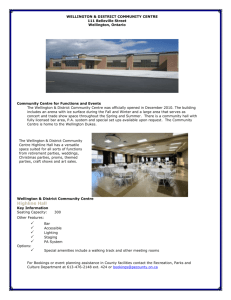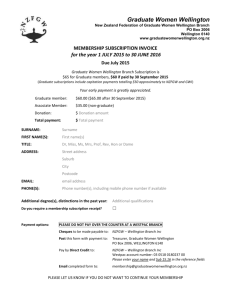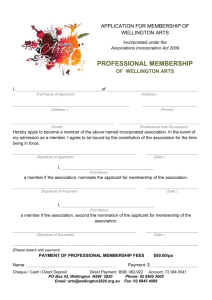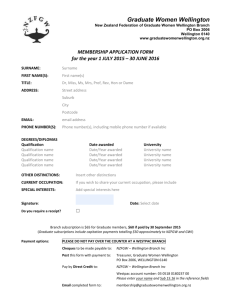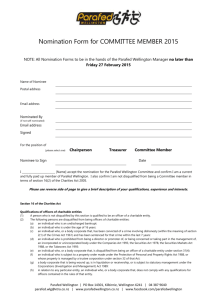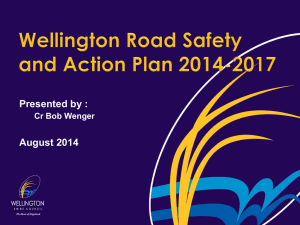Wellington City New World joined the eMission programme, in 2009
advertisement
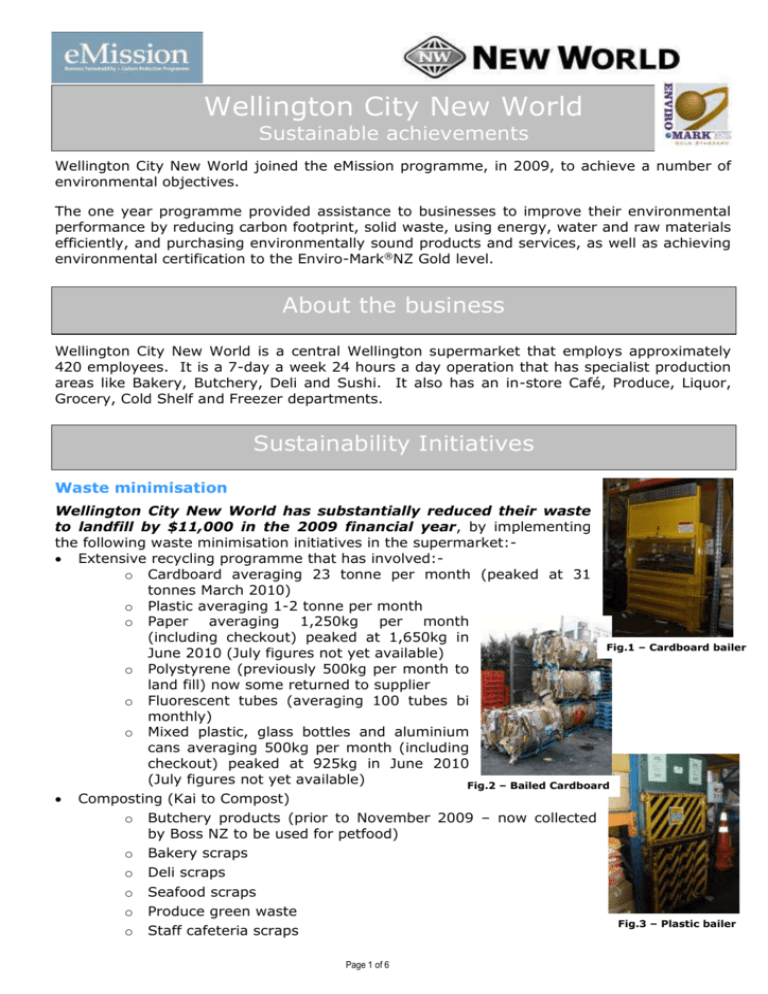
Wellington City New World Sustainable achievements Wellington City New World joined the eMission programme, in 2009, to achieve a number of environmental objectives. The one year programme provided assistance to businesses to improve their environmental performance by reducing carbon footprint, solid waste, using energy, water and raw materials efficiently, and purchasing environmentally sound products and services, as well as achieving environmental certification to the Enviro-Mark®NZ Gold level. About the business Wellington City New World is a central Wellington supermarket that employs approximately 420 employees. It is a 7-day a week 24 hours a day operation that has specialist production areas like Bakery, Butchery, Deli and Sushi. It also has an in-store Café, Produce, Liquor, Grocery, Cold Shelf and Freezer departments. Sustainability Initiatives Waste minimisation Wellington City New World has substantially reduced their waste to landfill by $11,000 in the 2009 financial year, by implementing the following waste minimisation initiatives in the supermarket: Extensive recycling programme that has involved:o Cardboard averaging 23 tonne per month (peaked at 31 tonnes March 2010) o Plastic averaging 1-2 tonne per month o Paper averaging 1,250kg per month (including checkout) peaked at 1,650kg in Fig.1 – Cardboard bailer June 2010 (July figures not yet available) o Polystyrene (previously 500kg per month to land fill) now some returned to supplier o Fluorescent tubes (averaging 100 tubes bi monthly) o Mixed plastic, glass bottles and aluminium cans averaging 500kg per month (including checkout) peaked at 925kg in June 2010 (July figures not yet available) Fig.2 – Bailed Cardboard Composting (Kai to Compost) o Butchery products (prior to November 2009 – now collected by Boss NZ to be used for petfood) o Bakery scraps o Deli scraps o Seafood scraps o Produce green waste Fig.3 – Plastic bailer o Staff cafeteria scraps Page 1 of 6 Other o o o o o o o o Produce surplus green waste to a local deer farm Bakery bread to the City Mission Customer paper recycling bins for dockets and lotto tickets Grease trap evacuated and cleaned weekly by an approved contractor Chicken fat collected to be made into soap Cream, milk and juice credits are collected weekly by Dawsons Reusable checkout shopping bags encouraged A flow meter is currently being installed (04-Aug-2010) on the grease trap to monitor the flow (ie volume) of trade waste. ESL monitors the quality of the discharge from the grease trap every 2 months. Storm water pollution prevention Wellington City New World has improved their storm water awareness and looked for methods to prevent any possible storm water contamination by: Drain to sea plaques installed on all external drains that lead to the sea Spill pallet purchased to catch any spillage from filling and emptying the chicken fat drums Spill booms have been purchased to prevent any storm water contamination in the unlikely event of a major spillage Cleaning chemicals and paints etc now stored in spill trays to capture any unlikely leakage. Fig.4 – Spill pallet for chicken fat drums Energy efficiency and conservation Wellington City New World has substantially reduced their energy consumption by $54,000 (including a reduction of 70,089.06 kWh of gas) in the 2009 financial year, by implementing the following energy minimisation initiatives in the supermarket: Limited use of instore gas fed laundry facilities, ensuring loads are full before being used Increased contractor laundered facilities (ie previously in-house) Computers turned off at night Lighting now turned off at night (or on timers) ie 12.15am to 6.45am (since July 2009) in the following areas: o 240 tubes in grocery aisles o Basement car park lights o Display cabinets o Storeroom large halogen lights turned off and 4 fluorescent tubes go on for night lights o ½ of main trade area lights turned off (always been the case as required for cleaners) o Offices o Staff facilities o Exterior security lighting also put on timers (ie 7pm6am) Oven logging just been completed – currently addressing production schedules in near future. LED lighting is currently being trialled (decision re purchased to be made in near future) T5 tubes with converts also being trialled Fluorescent light fittings with electronic ballast now replacing old Fig.5 – Rack Oven that was logged fittings with ballasts in the main trade hall Page 2 of 6 All major machinery only turned on when in use Starline dishwasher (with micro strainers) purchased to improve energy (and water) efficiency Refrigeration o Chiller door alarms o Chiller and shop cabinet curtains o Temperature alarms o Bio-zyme (MAF Approved) currently added to condensate lines that go to trade waste (used to break down fats) Hot water heated via excess heat from “refrigeration rack” Fig.6 – Chiller door alarm Heating:o Air-conditioning (heating) provided by excess heat from “refrigeration rack” o Recirculation of air in shop trading area controlled by roof baffles (and sensors) saving the need for cold air to be heated o Recent air conditioning audit discovered a heating fault that may have been in place for at least 4 years. As a result this has been corrected and the units now work together resulting in the ability to turn the shop temperature in the main trading area down by 2°C A $100,000 investment has been approved to replace our current condenser with an eco friendly fan combo that will result in considerable power savings. This is currently being manufactured. Further energy efficiency savings are being assessed by an ECOSMART electrician (Barry Winter, Winter Electrical) who has substantial experience in the supermarket sector. o All electricity usage was monitored by Barry to get accurate reports and timing to assist with further energy saving options – the result are currently being analysed. Water efficiency and conservation Wellington City New World has substantially reduced their water consumption by 4,374 cubic metres in the 2009 financial year (29.7% reduction from previous year) and has forecast a further reduction of 2,117 cubic metres for the 2010 financial year (21% reduction from previous year). Continual monitoring of our water usage identified a significant leak that was eventually located (in the garden) and repaired. This has reduced our overall water usage from 16,032 cubic metres to our current forecasted 8,155 cubic metres for the Fig.7 – Starline Dishwasher (new) 2010 financial year (a significant 50% reduction). This leak would never have been detected if it wasn’t four our monthly monitoring of our water usage. Reducing the amount of internal laundry services we do (ie not washing for one or two items) Starline dishwasher (with micro strainers) purchased to improve water (and energy) efficiency. Pre-rinse spray valve upgraded to more efficient model designed to save 50% water usage. Fig.8 – Pre-rinse spray valve PAGE 3 OF 6 Fuel efficiency Wellington City New World has improved our vehicle usage and mileage by minimising unnecessary trips, including trolley collections to scheduled times. Upgraded truck and van in 2009. Limited use of company truck and van – monitoring of mileage and fuel Control central warehousing ordering to limit number of delivery vehicles to site Suppliers and contractors Wellington City New World will be investigating ways of encouraging suppliers / contractor’s to improve their environmental performance in the coming year. One way this maybe achieved will be if Foodstuffs Wellington gets on board with the eMission programme as they have a lot of influence and buying power in the industry. We have also communicated our environmental policy, recycling programme etc to our contractors in their updated Contractor Obligations Package that is reviewed and signed off by the Contractor’s annually. Seafood suppliers are assisting with our waste reduction by taking back the polystyrene bins used to supply fish previously contributing to the 500kg disposed in our compactor waste per week. As polystyrene cannot be recycled and never breaks down in the land fill this is a significant reduction. Increased Organic Grocery section and monthly sales monitored since June 2009 Foodstuffs central warehousing in Palmerston North has reduced direct supplier deliveries by at least 80% Fig.9 – Increased Organic grocery section Encouraging Staff Behaviour Change Staff training programme eMission Champion’s meetings to update and educate on current eMission initiatives and progress All new staff inducted and introduced to eMissions (since July 2009) Department managers training workshop completed (November 2009) Supervisors and staff to receive training (added to training manuals in June 2010 Manual reviews) Fig.10 – Their Environmental Workplace Environmental Awareness training DVD purchased Awards and Certificates to assist with training and awareness for staff Checkout operators have been given paper recycling bins for unwanted till receipts which go into our paper recycling – currently investigating options for printing dockets on request only and also reducing size of the docket Recycling bins in all staff areas (ie paper, co-mingles) Encouraging Customer Behaviour Change Checkout Bags - Encouraging use of reusable bags by giving a $0.05 rebate on every reusable bag used by the customer (ie if 3 reusable bags used in the transaction $0.15 is credited to the customers shopping total). - January to the end of July 2010 Wellington City New World has voluntarily credited $7,619.00 back to our customers (an average of $1,100 per month) from a total of 152,380 reusable bags used by customers in the last 7 months. - Wellington City new World also has a voluntary charge of $0.05 per plastic shopping bags used by the customer that is then donated to an environmental organisation. 2,249 customers (approx 320 per month) have contributed from January to July 2010 (a total of $112.45) Customer information notice board in foyer - eMission updates, graphs, progress reports, Certifications, awards and achievements are on display for customer information and awareness of the program Customer suggestion box installed - To gather external comments and suggestions to further enhance actions towards the program and also a means of measuring customer awareness and involvement Fig.11 – Their Environmental Policy shown to customers Best Practice and Awards Wellington City New World is Enviro-Mark®NZ Gold certified. Greater Wellington Regional Council’s Environmental Award in December 2009. Wellington City New World is WSMP ACC accredited to Tertiary level since June 2006. Wellington City New World also has annual Food Safety audits (since 2001) to comply with the NZFS Approved Food Safety Programme and exemption. Plaques installed on storm water drains (ie drains to sea) Other benefits This programme was a real eye opener and has created a new type of culture and awareness in our supermarket. We have always been a food safety and health and safety focused organisation however, environmental consideration is just as important and is closely related. The savings generated from simple practices and little cash outlay has been priceless in such an economic climate. Increased awareness among staff and customers has been beneficial not only for the company but also extends to their families and community. Challenges There are many; patience, time, money, willingness and understanding to name just a few. This can be a slow process as it is still quite new and therefore urgency and understanding is sometimes not appreciated. You need to have commitment and buy in from the people with the chequebook, as sometimes you need to spend money to save money. PAGE 5 OF 6 The future Wellington City New World will continue monitoring their data and improve the systems they have already put in place. By training staff and building on their culture of environmental sustainability awareness they will be able to look for new ways of reducing their carbon footprint and impact on the environment. They will continue to lead by example in the supermarket industry and encourage Foodstuffs Wellington to get on board and then use their influence with suppliers. Advice for others Their advice is to first get a support team on board including senior management and / or directors etc so that there is direction and commitment to the programme. Then take small steps. Work on one or two areas that your company has control (and you are able to receive an economic payback) over and impacts on the environment the most (for example waste and electricity). Once these have been identified you can address your impacts and aspects and put the controls in place to manage these. Finally use any support groups, advisors, programme colleagues etc – they all have great ideas and systems and though not all maybe relevant you can dissect and use what is. Good luck! Contact details Loren Parker E-mail: Loren.Parker@foodstuffs-wgtn.co.nz Ph: 04 384 8054 Wellington City New World 279 Wakefield Street PO Box 3327 Wellington
